‘The Moby Dick of carpeting’: Delco author pens novel about his working-class father
David Amadio’s debut novel is based on his father, a carpet master in Upper Darby.
Listen 4:26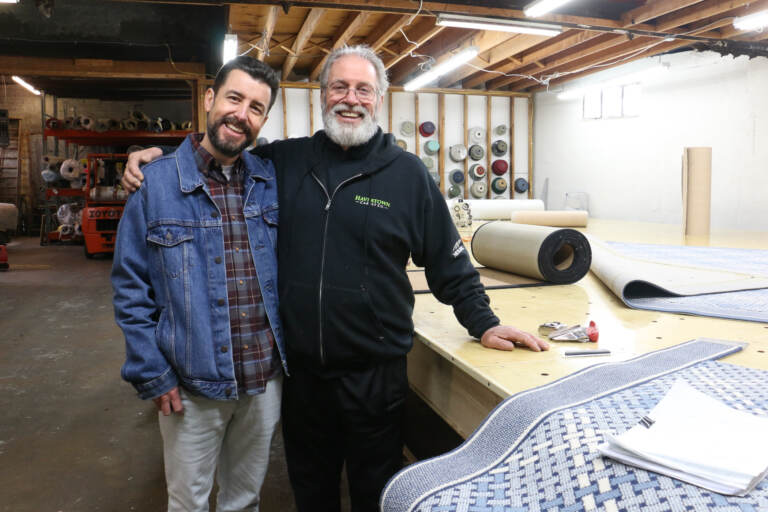
Jerry Amadio poses with his son, David, in his workshop in Upper Darby. (Emma Lee/WHYY)
David Amadio grew up working beside his father, Jerry, installing carpeting inside homes in Delco and the Main Line.
It didn’t take him long to realize he’s not very good at it.
“My dad’s genius is in his hands,” said Amadio, who now teaches writing at Lincoln University. “I would be working a job and we would get to a point where my hands just failed me. I could do some prep work, I could put the pad down, put the tackles down. But when it came to the real finishing work — the stuff that people would see — that was not my strong suit.”
“That’s when I would take out my notebook and record observations,” he said. “Eventually, it’s the stuff that got into the book.”
That book is “Rug Man,” Amadio’s debut comic novel about an aging carpet installer working at a frantic job site where dozens of other contractors are stepping over one another to get their work done.
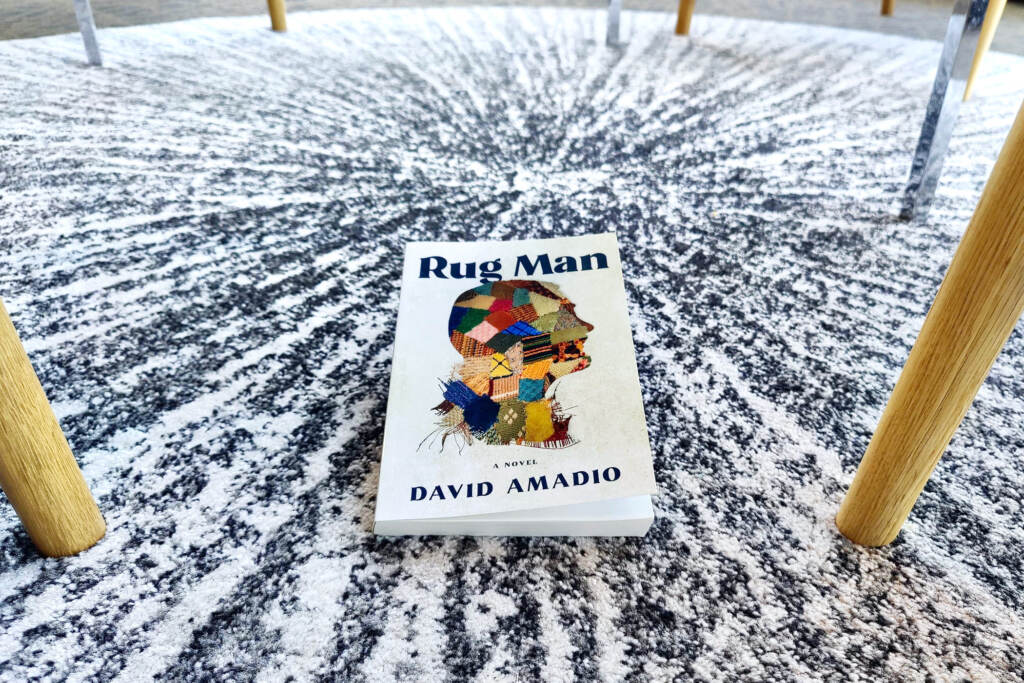
The central character, Frank, is based on Amadio’s father, who has been laying carpet for nearly 50 years inside upscale homes for people like actor Will Smith, former 76er Ben Simmons, news anchor Jim Gardner, former Phillie Lenny Dykstra, Comcast CEO Brian Roberts, and the philanthropists Walter and Leonore Annenberg.
David gave Jerry early drafts of the book to read over.
“I loved every minute of it because it was like a redo of my life,” said Jerry. “[David] said, ‘It’s loosely based on you.’ And I said, ‘I don’t know — this isn’t so loose. It’s pretty accurate.’”
Jerry calls himself an “old school” tradesman, having learned the carpeting business from his uncle in the 1970s and eventually buying the family business, Ascot Carpets, in the 1980s. He ran the business out of a warehouse in Upper Darby until he sold it to Havertown Carpet Company a few years ago. He still prepares and installs carpets under the new company.
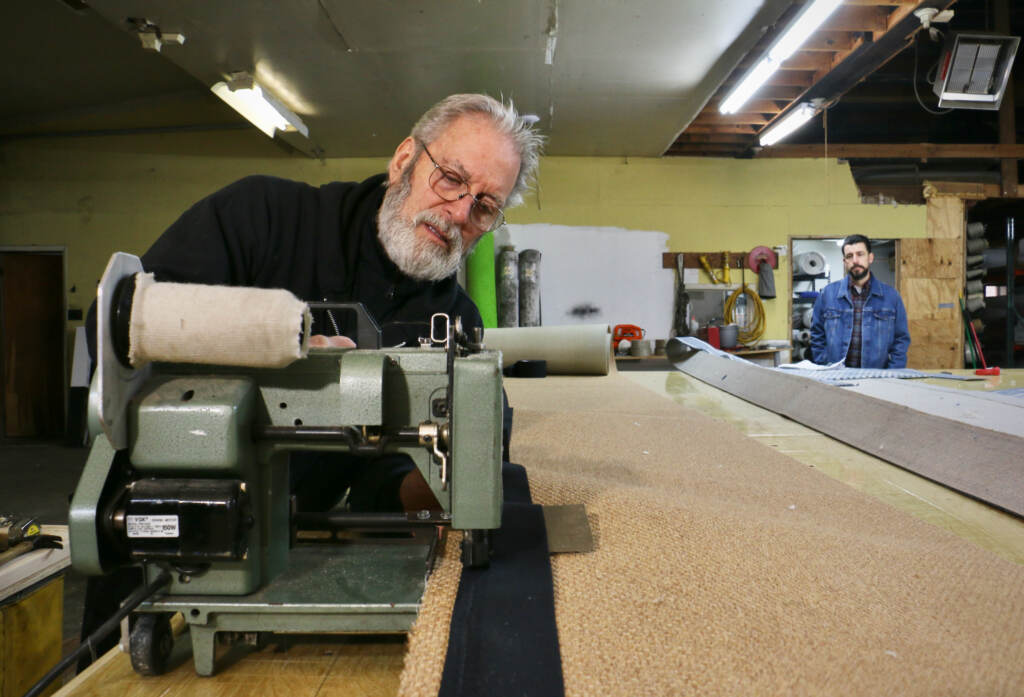
For a recent job, he was on his hands and knees in the warehouse sealing a border on a rug. This requires stitching by hand with an industrial needle and heavy linen thread.
“Most sealing done today is done with an iron. They burn it – there’s a silicone glue on the tape,” Jerry explained. “But if you do that, three or four years later the yarn will crop and kind of pull away, and you’ll be having voids in the seam.”
Instead, Jerry propped the carpet border on the corner of a 4×4 piece of lumber, so the seam created a peak, then stitched the pieces together on a bias. That way the seam will pull together tightly when the carpet is laid flat.
“It’s important to know how to do it, but unfortunately it’s being lost,’” he said. “A lot of the young guys are all about quickness and get it done and get paid. Whereas I’m kind of old school. I do a lot of designer work. I did it slowly and I did it efficiently, and that’s why for 50 years I’ve been doing this, and still doing it, because they still seek me out even at 72 years old.”
David watched his father ply his trade for years, and many of the 188 pages of “Rug Man” are devoted to describing the minutiae of laying carpet, as well as the tools and hand work and mechanical strategy needed to get the job done right.
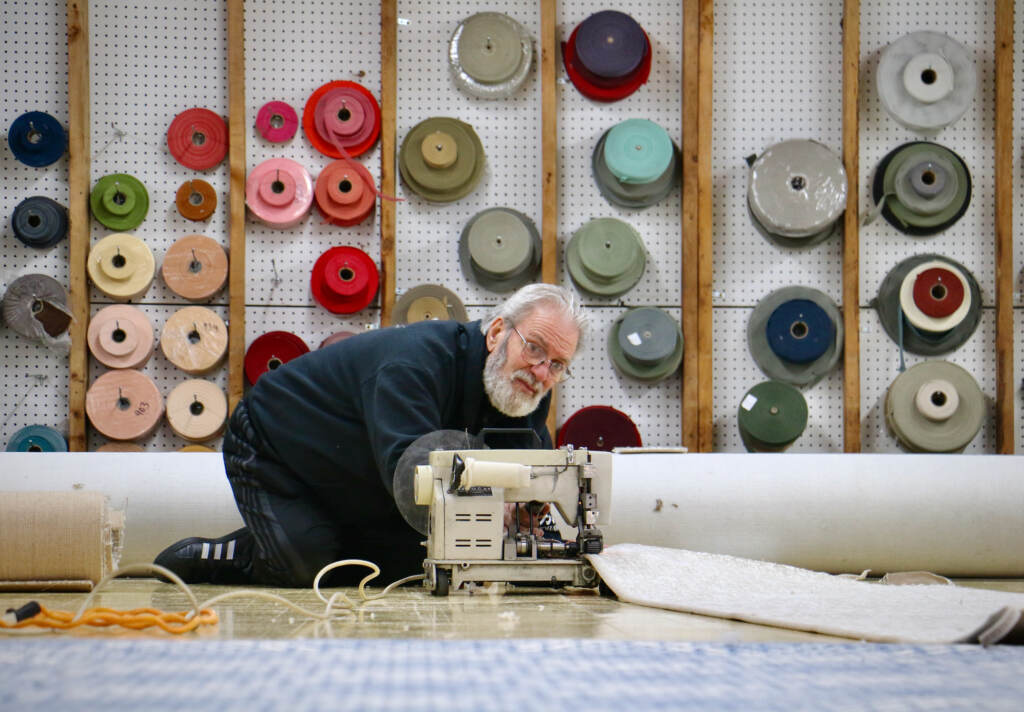
In that way, he feel the novel has a kinship with the classic “Moby Dick,” in which Herman Melville spends whole chapters teaching the reader about whales and the history of the whaling industry.
“There were times when I said, ‘I feel like Melville at this point.’ Instead of the sperm whale, it’s the tuck knife and the kicker and the tapestry binder,” said David. “There really is a beauty and a grace to it. I wanted to capture that in the description. It’s something that a lot of people don’t even really think about. A rug, it’s almost like an afterthought. Only in its absence do you see a rug. My dad’s been looking at them and working with them for years, and I wanted to honor that attention in the book…It is the ‘Moby Dick’ of carpeting.”
Like Captain Ahab, Jerry’s pursuit of his own white whale did not come without personal sacrifice.
“My left knee is pretty well destroyed, but I can’t replace it because then I won’t be able to kneel down,” he said. “I’m still working with the tools. I don’t know when that will end. I think when they put me into Arlington Cemetery, that’ll be the end. Put a few tools in the casket.”
“He’ll be upholstering heaven,” David laughed. “He’ll be carpeting heaven.”
“Well, I’m hoping they don’t need any carpet,” Jerry muttered.
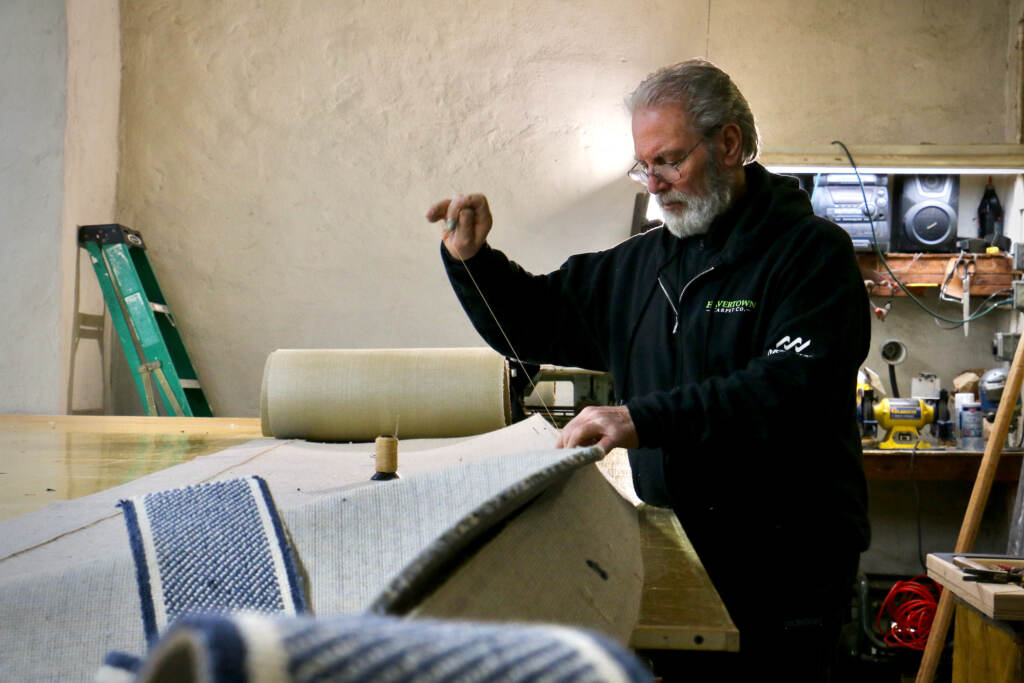
“Rug Man” is more in the tradition of blue-collar novels, like the slaughterhouse workers of Upton Sinclair’s “The Jungle” and the bricklayers of Pietro Di Donato’s “Christ in Concrete.”
“There aren’t a ton of books out there about the working life,” David said. “I guess people don’t think there’s any true literary value or literary merit in it. Like, there are no deep themes. Because I spent so many years on those jobs and I made so many observations, I felt like there is something rich in this world. It ended up being about class struggle.”
David took a more comic tone than some of those earlier, more bleak novels. He said one of the ways those long days on the job were made bearable was by joking around.
“Comedy has always been a big part of my life,” said David, who has been making short films with his comedy sketch troupe, The Minor Prophets for more than 20 years. “Comedy was what saved my brother and I and my dad on a lot of these jobs. We could laugh at the other contractors. We could laugh at the crazy homeowner. We could laugh at the designer who couldn’t schedule her way out of a paper bag.”
“So much of the job is funny. Like when we found the dildo,” David said. At one point in “Rug Man,” the carpet crew had to remove all the furniture from a bedroom in order to replace the carpet when suddenly, a sex toy accidentally fell out of a piece of furniture.
“It went into the book because it was one of the funniest things that ever happened to us when we were on the job,” David said.
One of the central storylines in Rug Man is a conflict between a father who senses he is coming to the end of his career, and his son who does not want to be part of the business. In the novel’s climax, the fictional Frank has to leave the carpeting business for reasons the real Jerry has never experienced. But it was important to David put a father-son relationship at the book’s core.
“I wanted to write a book for him because he’s sacrificed so much. He’s worked so hard for half a century to provide for the family,” David said. “It felt like the right thing to do for the first book.”
“Now I have to write one for my mom,” he added. “Because she’s pissed.”

Saturdays just got more interesting.
WHYY is your source for fact-based, in-depth journalism and information. As a nonprofit organization, we rely on financial support from readers like you. Please give today.






